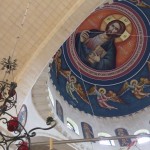
Watch this video! It’s a deep well…
Life in the West Bank
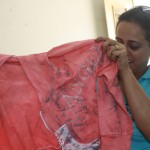
To help local women earn money to supplement their family’s income, Fr. Firas and his sister, Dema, started a sewing project in Zababdeh.
Dema manages a staff of six women, both Muslims and Christians, who sew clothes for an Israeli company. Â Fr. Firas considers it a sweatshop because of the unfair wages the women are paid by the Israeli company for their product. Â Each of the women make about 700 shekels a month, enough to pay for basic needs. Â Dema receives about 1,000 shekels per month. Â With that she pays the buildings rent, water and electricity and is able to pay for some basic needs of her family.
The price tag on one pair of pants was 171 shekels, 25 percent of one woman’s salary for one month. Â But, the women continue to work because work is scarce and they have no other choice.
Fr. Firas and Dema are happy to be able to provide work for women in Zababdeh, even if it pays little. Â Dema hopes her children will have a better life, not having to depend on others for help.
Listen to Fr. Firas and Dema talk about the sewing project.

In a week, An Najah will host a Human Rights film festival in Nablus. Â Wanna join me?!
Read original article at Maen News
NABLUS (Ma’an) — The largest university in the northern West Bank will host its first human rights film festival at the end of September, organizers announced on Wednesday.
Starting 26 September and running through the end of the month at the Zafr Masri Theater on the university’s old campus, a series of films will be accompanied with talks and video conferences to organizations in other cities and countries also working in the field of human rights.
Issues of focus, a statement said, will be the Gaza Strip, the Palestinian resistance and Palestinian refugees as well as social and cultural issues such as the rights of women.
The first evening will host staff of the Mental Health Program in Gaza, with subsequent panelists including a South African human rights center and American university students who will tune in and join discussions.
The event is organized by the UNESCO Chair on Democracy and Human Rights at An-Najah National University, directed by Doctor Raed Abu Badawia.
“The festival is part of the continuous struggle of the Palestinian people who seek above all to live in freedom and dignity,” Abu Badawia said in a statement announcing the festival.
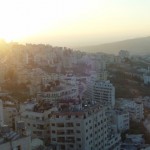
I met Abu Fadi when I was mailing a package to the U.S. for a friend. Â He was abundantly helpful and welcoming, even during this short business transaction. Â Awhile later, I stopped by his office just to say hi, and he invited me to his home for a Ramadan dinner. Â He and his wife cooked together and cracked jokes, while I chopped vegetables for a salad. Â After a delicious meal, we sat on the porch drinking coffee and chatting about Ramadan.
Here are some of the things we talked about.
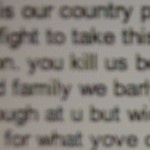
In March 2009, I visited a friend’s home in Palestine. Â Her young daughter, Nadine, wrote the below poems.
our country
you look see feel
but no
u do look
u do see
but u do not feel
stop
pause
and look around
u see up and down
every were no one wants u
just go away.
this is our country place and life
stop talking it away
when its not rifuallly yours.
you kill us
beat us
we fight back for our lifes
but wait
u fight to take this place
just go away.
it happend to u disscrimanasion
but u dont think of it at all
and do the same to us discrimanasion.
you kill us
beat us
but u never feel if we had the same wepinz
we would be wining.
this is not a fair fight
u have food supplize and family
we barly have any just go away.
dont u see what u have done
yove killed children for no reasen.
you through at us
we through at u
but wich one is stronger
yours
just go away.
its our country place and lifes
stop steeling it away
your smiling and happy for what yove done
ITS OUR COUNTRY GO AWAY!
The window
when u look threw the window what do u see
the wind there and the rain for me .
but look closley and see can u find the great wisdom and happyness for u .
look threw the right window that is for u
pick it with goodness and right
look threw the window that is bright.
there is the side of sadness and hate and the side to smile and be happy,
pick the right window when u you look closley you will no the path foe you .
look threw the window that is right for you.
commmunicating peace
peace is the choice u pick in life
how u commmunicate peace
a lovely wonder and wisdom
you need look closly
and hold each others hands
and rome in harmony
and love to eachother
block the bitterness
enter the wonder and wisdom and have a peaceful life.
life
life is a great thing that u can sometimes dought life passess fast and runs long ways the choice of your life is up to you hold it tight so it never gets loose. dont you see what life is what ever u so will effect u pick the right choice.
peace freedom love
peace freedom and love
that what we need want it and make it bigger
bring the peace bring it strong so we can live toghther and get along
we need it yes we do
also if we want the peace the love has to be there
peace oh peace pray for it so we can get along
we need it
we have to love so peace will be a peace and just get along peace.
believe in the peace
if we want peace we have to work and belive for this wonder to be and for peace to be come bigger we have to love and hold on to each other and make the peace a bigger and bigger if we want the the peace we have to live it  and want it we all get toghther make the vive of peace stronger so we can live with happyness peace we need it in life we have to hold is and beliven what is right choice and path to pick. pick it know and have the peace in your heart peace we need it some people dont want it but try to change there mind never never say that this can never happen peace is what we need PEACE.
the goal peace
peace peace thats what we need we want peace yes we do were striving for peace little bye little bigger by bigger the steps get big the steps get small but alalong we succseed out goal peace in the middle east.

CPTnet Digest, Volume 33, Issue 5
A newsletter written by members of the Christian Peacemaker Teams
10 September 2010
At 3:30 p.m. on 24 August 2010, thirty-four soldiers gathered at the alley in front of the CPT apartment. Five soldiers stood at the entrance to the alley to keep the onlookers back while the others broke open shop and apartment doors along the street.
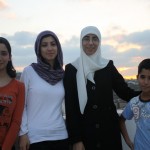
One of my Advanced English students, Nasreen (she’s wearing the white headscarf in this photo), invited me for Ramadan iftar (dinner) with her family on September 5th. Â She lives in a village near Nablus, called Sarra. Â We ate on their second floor porch with a beautiful view of the magnificent sunset and the hilly, desert countryside spottedwith olive trees and villages.
Israeli Army jeeps drove by the fire and did nothing. This happens all over the West Bank all the time, especially in villages like Sarra, that are surrounded in all directions by Israeli settlements. Â Did this make the news?
No.
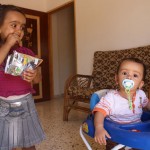
“You drive the car. I know you miss driving,†said Fr. Firas while driving me home from a visit to the Jenin refugee camp, a few miles from his church in Zababdeh, West Bank.
“But I don’t know how to drive stick!â€Â I cried, knowing that in a few minutes I would be behind the wheel.
“You’ll learn in Palestine!â€Â He laughed, and I soon found myself on a nearly empty road, short legs struggling to reach the clutch in his old, white station wagon.
Fr. Firas wants me to “get my hands dirty†in his town. Each Sunday, he tells stories about his life, introduces me to congregation members, includes me in Sunday lunch with his family and takes me on trips to important local sites, like the refugee camp in Jenin, still torn with bullet holes from the second intifada.
Fr. Firas has “many hopes†for the connection between his congregation, St. George Melkite Church, and congregations in other countries.    Fr. Firas recalled an Aramaic word in the Beatitudes, “tubayhoun,†which he translates into: to work, or to make a change. He says it’s an active phrase, telling you to do something for the poor, the prisoners and the ignored. “We need you to tubayhoun, or to change the daily situation of Palestine in the occupation,†he said.
Fr. Firas faced an enormous hurdle when he began as the priest at St. George eight years ago. The church hadn’t had a priest in 18 years, the parsonage and church were in physical ruins and the community felt abandoned. Fr. Firas rubbed his hands together and got to work.
He started rebuilding the church with cement and paint, and soon the doors were opened. Four people attended his very first church service in Zababdeh, all of whom were his family.  He persevered and started programs that included the entire community of Zababdeh.
One of his programs currently sponsors 50 students to attend a local school that provides a strong education. $500 pays for the student’s books, clothing, school fees and sports for one year. Fr. Firas hopes the sponsorship program will build the kids’ future, open their minds and teach them about acceptance.
Fr. Firas started an olive oil soap program to support local olive farmers who do not receive a fair price from Israelis for their product and to provide work for locals. He pays a fair price for the olive oil and provides it to local women to make into soap, which he sells for $3 per bar. Due to the cost of buying the olive oil and the packaging, paying the workers and shipping the soap, he only makes $1 per bar. The profit from the olive oil soap program typically supports the student sponsorship program.
He also has a sewing project for women in Zababdeh, Jenin and Raba. The sewing project provides work for 13 women, both Christians and Muslims. “Inshallah we can bring in Jewish people as well,†Fr. Firas said. The women work from 7am-3pm, but they can leave whenever they need to if they have children or prefer to work part-time.
His newest program is a kindergarten, opened on September 24, 2010. He hired two teachers and there are 10 students currently enrolled. Fr. Firas hopes more students will sign-up and dreams of opening an elementary school next. This program provides day care as well as the opportunity for young graduates to work if they haven’t yet found a job.
Fr. Firas said that he’s checking items off his list of dreams: becoming a priest, rebuilding the church in Zababdeh, starting a kindergarten, etc. His congregation now has 200 members. He encourages people to come to Zababdeh to see the relics and stones, but more importantly, to meet the living stones in his community.
To watch short video clips and read more about the residents of Zababdeh go to: Salt Films.
Visit the St. George Church website.
Watch a short video introducing Fr. Firas and his programs at St. George.